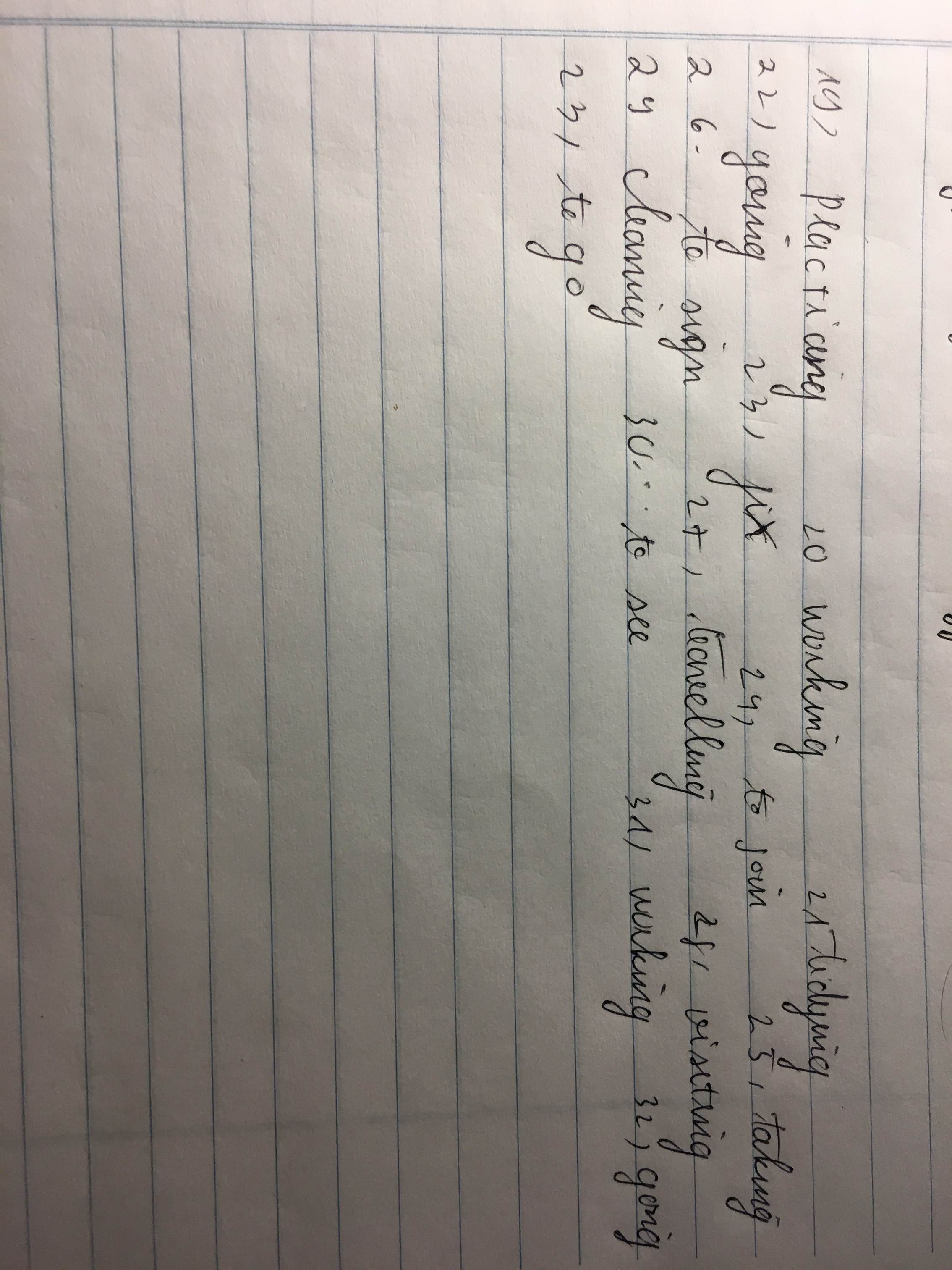the girls in class...now (write)
Hãy nhập câu hỏi của bạn vào đây, nếu là tài khoản VIP, bạn sẽ được ưu tiên trả lời.



1. Lan / play/ piano/ at the moment ………Lan is playing the piano at the moment……………………………………………
2. The boys/ study/ math/ now. ……The boys are studying math now…………………………………………………..
3. The girls/ learn/ how/ make/ cakes.…THe girls are learning how to make cakes………………………………………………….
4. They/ have/ breakfast/ school canteen.They are having breakfast at the school canteen…………………………………………………..
II. Use the correct form of the verbs in brackets to complete the passage
There (be) …is……….. a library in our school. Mr. Tu (be) …is……… our librarian. He (open) ……opens……. the library at 7:00 and (close) …closes……..it at 11:00. Students often (come) …come…..to the library (read) ……to read….. books. He (be) …is…… in the library at the moment. Some students (borrow) ……are borrowing…. some books. Others (sit) ……are sitting… at the table in the middle of the room and (read) reading……..the books they want. The library (be) ……is….very helpful in (develop) ……developing.. the children’s love for books and their habit of (read) ……reading………… III. Complete the sentences with prepositions: The magazine are ………on…… the shelves ……to………. the right. Those books ……at…. the back …of….. the library are …in… English. When I go to the library, I sit and read …about……… wonderful things. The science books are …on…… the rack …at. the corner of the room. It’s easy to find a book ……by………… the title.

1 am cleaning
2 Are they preparing
3 are writing
4 aren't playing
5 are celebrating
6 am studying
7 is phoning
8 is wearing
9 are looking
10 is coming
11 is cleaning
12 are - laighing
13 am talking
14 are dancing
15 is opening

In Britain there is a (1)___holiday______ now which people call Mother’s Day. In the old days many girls from working-class families in towns and cities and from farmers’ families in the country worked in rich houses. They had to do all the (2)___housework______ and their working day was usually very long, they often (3)___worked______ on Sundays, too. Once a year, it was usually one Sunday in March, they could (4)____visit_____ their mothers. They went home on that day and (5)____brought_____ presents for their mothers and for (6)___other______ members of their families. They could stay at home only one day, and then they went back (7)___to______their work. People call that day Mothering Day (8)____or_____Mothering Sunday.
Later workers at the (9)___factories______ and girls who worked in the houses of rich families received one free day a week, and Mothering Day became Mother’s Day. It is (10)____the_____ last Sunday in March.

In Britain there is a (1) holiday now which people call Mother’s Day. In the old days many girls from working-class (2) families in town and cities and from farmers’ families in the country work in rich houses. They had to do all the (3) housework and their working day was usually very long. They often worked on (4) Sundays, too. Once a year, it was usually (5) on Sunday in March, they could visit their mothers. They went home on that day and (6) brought presents for their mothers and for other members of their families. They could stay at home only one day, and (7) then went back to their work. People call that day Mothering Day or Mothering (8) Sunday. Later, workers at the factories and girls who worked in the houses of rich families received one (9) free day a month, and Mothering Day became Mother’s Day. It (10) is the last Sunday in March.

My daughter.Jane, never dreamed of receiving a letter from a girl of her own age in Holland. Last year, we were traveling across the channel and Jane put a piece of paper with her name and address on it into a bottle. She threw the bottle into the sea .She never thought of it again, but ten months later she received a letter from a girl in Holland.Both girls write to each other regularly now, However, they have decided to use the post office. Letters will cost a little more, but they will certainly travel faster.
1.Did Jane dream of receiving a letter from a friend in Holland
-No, she didn't
2.When did Jane cross the channel?
-last year
3.What did she threw into the sea?
-She threw the bottle into the sea
4.What did it contain?
-a piece of paper with her name and address
5.Do the two girls write to each other regularly now?
-yes
6.Why do they decide to use the post office?
-Letters will cost a little more, but they will certainly travel faster.
My daughter.Jane, never dreamed of receiving a letter from a girl of her own age in Holland. Last year, we were traveling across the channel and Jane put a piece of paper with her name and address on it into a bottle. She threw the bottle into the sea .She never thought of it again, but ten months later she received a letter from a girl in Holland.Both girls write to each other regularly now, However, they have decided to use the post office. Letters will cost a little more, but they will certainly travel faster.
1.Did Jane dream of receiving a letter from a friend in Holland
- No, she didn't
2.When did Jane cross the channel?
- Jane crossed the channel last year
3.What did she threw into the sea?
- She threw the bottle into the sea
4.What did it contain?
- It contained a piece of paper with her name and address
5.Do the two girls write to each other regularly now?
- Yes, they do
6.Why do they decide to use the post office?
- Because letters will certainly travel faster

are writing
are writing